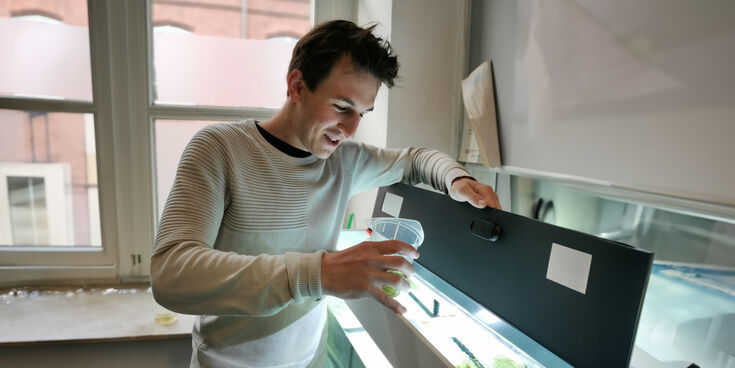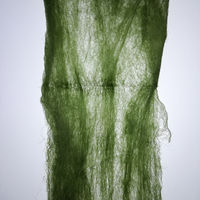The textile industry is considered unsustainable and has a reputation for contributing to global environmental pollution. The Hochschule Niederrhein is constantly developing new projects to counteract this. Leon Blanckart thinks so too. The Master's student in Textile Products wants to show that textile production can be done differently. He wanted to move away from plastic fibres, which are suspected of leaching microplastics into the water, and from cotton, which consumes too much water and uses enormous amounts of pesticides and fertilizers to grow in monocultures. That's how I came up with algae as an alternative raw material for fibers," says the 25-year-old, whose Bachelor's thesis was the first to explore the possibility of producing textiles from aquatic biomass in the future.
An innovative and sustainable idea - after all, algae have already come into focus in the pharmaceutical and food industries, partly because they have many interesting properties, such as having an antibacterial effect. "However, the textile industry has not yet focused on them as an independent fiber. Yet algae grow quickly under the right conditions and can be cultivated in a resource-saving way," says Leon Blanckart. When he received three major prizes for his Bachelor's thesis, it was clear that the topic had potential. And so, parallel to his Master's degree, he started the AlgaTex research project as an idea generator in the Federal Ministry of Education and Research's "New Products for the Bioeconomy" ideas competition, which was submitted to the Jülich Project Management Agency by the Faculty of Textiles and Clothing at The Hochschule Niederrhein in spring 2021. The project is headed by Professor Ellen Bendt, who already supervised Blanckart's thesis and also sees great potential in the use of algae as a fiber raw material.
The project is currently in the exploratory phase. In June, the research team will then present its project in a competitive situation in Berlin in order to assert itself against other innovative ideas and projects and receive funding for a subsequent three-year feasibility phase. "As we are textile experts and not biologists, we need various partners at our side," says Leon Blanckart. Inter-university collaboration with the Institute of Plant Sciences and Microbiology at the University of Hamburg, with which the research team has been working for some time now, plays an important role. "The team there repeatedly identifies various potentially interesting algae species, which we test for their textile usability in the university's diverse laboratories, and supports us with its biological expertise." A laboratory has also been set up at the university for this purpose, where algae are cultivated on a small scale.
However, before the idea can be scaled up to an industrial level, more than just the space problem needs to be solved. "The aim is to produce a textile product from algae in a sustainable way," says Leon Blanckart. "The algae should therefore come from a circular economy wherever possible. In the long term, for example, cooperation with fish farmers who are active in the field of aquaponics and can imagine combined algae and fish farming is possible." In principle, there are many different types of algae with different surface structures and properties. "I'm looking for algae that are structured in such a way that they can be processed for textile use."
The student, who works as an idea generator and graduate assistant in the research project, can well imagine a spin-off. "At the beginning of my studies, self-employment wasn't an issue for me at all. But something has changed - here at the university too. The HNX team has brought the topic of start-ups very much into focus. There is now an interesting network here that offers a lot of support. For example, I had no idea how you have to secure yourself contractually when you bring project partners on board. The HNX team gave me very good advice on this. The workshops and lectures are also interesting. For example, the presentations by other founders - and then you learn that it's okay to fail sometimes."
Currently, the focus is on finding interested project partners for a possible feasibility phase of the project. "Above all, the question of how we can cultivate the algae in large quantities needs to be answered," says Leon Blanckart. "As well as the development of processes for optimal extraction, textile preparation and processing and narrowing down the range of textile applications. Textile partners could come from the production fields of nonwovens, woven and knitted fabrics as well as from the product areas of functional clothing, PPE or other technical applications due to the properties of the algae that have been identified so far."
Leon Blanckart is glad that he can experience a smooth transition between his studies and his career thanks to "Algatex". "My focus is on the algae project and a possible start-up. I don't have to worry about what comes after my Master's degree in the summer. I am particularly happy that I can make a contribution through the project to perhaps making our world a little more sustainable. This idea is very important to me."



















